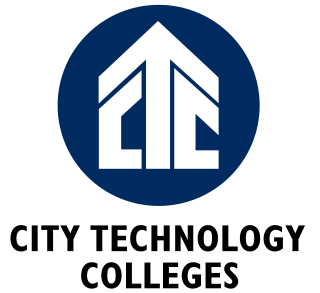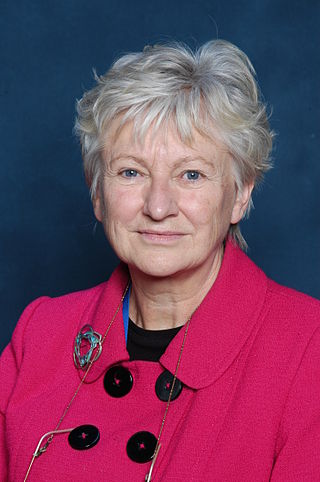Related Research Articles

In England, a City Technology College (CTC) is an urban all-ability specialist school for students aged 11 to 18 specialising in science, technology and mathematics. They charge no fees and are independent of local authority control, being overseen directly by the Department for Education. One fifth of the capital costs are met by private business sponsors, who also own or lease the buildings. The rest of the capital costs, and all running costs, are met by the Department.

The Geographical Association (GA) is an association in the United Kingdom. The organisation aims to improve geographical knowledge of the public through promoting geographical education. It is a registered charity and is independent of state aid.

An academy school in England is a state-funded school which is directly funded by the Department for Education and independent of local authority control. The terms of the arrangements are set out in individual Academy Funding Agreements. 80% of secondary schools, 40% of primary schools and 44% of special schools are academies.

Education in Botswana is provided by public schools and private schools. Education in Botswana is governed by the Ministries of Basic Education. and Tertiary, Research Science and Technology Among sub-Saharan African countries, Botswana has one of the highest literacy rates. According to The World Factbook - Central Intelligence Agency as of 2015, 88.5% of the population age 15 and over can read and write in Botswana were respectively literate.

Student voice is the individual and collective perspective and actions of students within the context of learning and education. It is identified in schools as both a metaphorical practice and as a pragmatic concern. Tech educator Dennis Harper noted that student voice gives students "the ability to influence learning to include policies, programs, contexts and principles."

The American Educational Research Association is a professional organization representing education researchers in the United States and around the world. AERA's mission is to advance knowledge about education and promote the use of research in educational practice.

Medical education in Australia includes the educational activities involved in the initial and ongoing training of Medical Practitioners. In Australia, medical education begins in Medical School; upon graduation it is followed by a period of pre-vocational training including Internship and Residency; thereafter, enrolment into a specialist-vocational training program as a Registrar eventually leads to fellowship qualification and recognition as a fully qualified Specialist Medical Practitioner. Medical education in Australia is facilitated by Medical Schools and the Medical Specialty Colleges, and is regulated by the Australian Medical Council (AMC) and Australian Health Practitioner Regulation Agency (AHPRA) of which includes the Medical Board of Australia where medical practitioners are registered nationally.
SSAT Limited is a UK-based, independent educational membership organisation working with primary, secondary, special and free schools, academies and UTCs. It provides support and training in four main areas: teaching and learning, curriculum, networking, and leadership development.

Kura kaupapa Māori are Māori-language immersion schools in New Zealand, where the philosophy and practice reflect Māori cultural values with the aim of revitalising Māori language, knowledge and culture. Kura kaupapa Māori are established under the Education Act (1989). The term kaupapa Māori is used by Māori to mean any particular plan of action created by Māori to express Māori aspirations, values and principles.
European Schoolnet or EUN is a network of 34 European Ministries of Education, based in Brussels. As a not-for-profit organisation, it aims to bring innovation in teaching and learning to its key stakeholders: Ministries of Education, schools, teachers, researchers, and industry partners.

The JCB Academy is a non-selective co-educational secondary school within the English University Technical College programme, in Rocester, Staffordshire, England. It specialises in engineering and business qualifications.
The US–China Education Trust is a non-profit organization based in Washington D.C. Founded in 1998 by Ambassador Julia Chang Bloch, the first Chinese-American U.S. Ambassador, USCET seeks to promote China–United States relations through a series of education and exchange programs. The organization sponsors a variety of fellowships, conferences, workshops and exchanges, focused primarily on strengthening Chinese academic institutions related to the fields of American Studies, Media and Journalism, American Governance, and International Relations.
The Academic Pediatric Association (APA) is a professional pediatric organization that represents approximately 2000 health care professionals in academic general pediatrics. Membership is open to physicians, nurse practitioners, doctoral trained professionals, students, and other child health experts. For the past 20 years, the APA has been one of the co-sponsors of the annual Pediatric Academic Societies meeting, the largest regular pediatric research meeting in the world. The APA also sponsors regional meetings and provides members with numerous forums to collaborate on academic endeavors that benefit children. Four standing committees direct multiple programs within the APA, and its 38 special interest groups (SIGS) work on areas relevant to child health.

Sarva Shiksha Abhiyan, or SSA, is an Indian Government programme aimed at the universalisation of Elementary education "in a time bound manner", the 86th Amendment to the Constitution of India making free and compulsory education to children between the ages of 6 and 14 a fundamental right. The programme was pioneered by former Indian Prime Minister Atal Bihari Vajpayee. It aims to educate all children between the ages of 6 and 14 by 2010. However, the time limit has been pushed forward indefinitely.

Angela W. Little is Professor Emerita at the Institute of Education, University of London. She is known for her work in primary education policy and practice in developing countries as well as education planning, program evaluation and assessment. In particular she has focussed in seven main areas:
The National Association for Special Educational Needs (NASEN) is the leading organisation in the United Kingdom which aims to promote the education, training, advancement and development of all those with special and additional support needs. The organisation provides advice, training and support to education professionals and its work on behalf of its members helps to inform special educational needs policy.
The Teacher Development Trust is a UK charity which works to raise awareness of the importance of professional development for teachers and other education professionals.

Robin Alexander is a British educationist and academic known particularly for championing the cause of primary education, for his leadership of the Cambridge Primary Review, and for his research and writing on education policy, culture, curriculum, pedagogy, dialogic teaching and comparative and international education. He is currently Fellow of Wolfson College at the University of Cambridge and Professor of Education Emeritus at the University of Warwick. In 2011 he was elected Fellow of the British Academy (FBA), the UK's national academy for the humanities and social sciences and chaired its Education Section 2018-21.
The Project for the Study of Alternative Education in South Africa (PRAESA) is a multilingual, early literacy research and development organisation, affiliated with the University of Cape Town. PRAESA's work in literacy approaches, curricula, training, materials development and research has meaning making, stories and imagination as its compass point. PRAESA's aim is to ensure all young children from diverse language, class and cultural backgrounds have appropriate opportunities to become imaginative and critical readers and writers.
References
- ↑ Roy Blatchford 'Passion for learning in desert heat' Times Educational Supplement, June 2009 retrieved on 10.11.09
- ↑ website, NET Academies Trust. "NET Academies Trust - 404 Error". www.nationaleducationtrust.net.
- ↑ The Honourable Society of the Inner Temple, 'Opening Doors: Social Mobility and the Bar' Archived 2011-06-10 at the Wayback Machine retrieved 10.11.09
- ↑ website, NET Academies Trust. "NET Academies Trust - 404 Error". www.nationaleducationtrust.net.
- ↑ Mike Baker 'Who rules in the classroom?' BBC News Online retrieved 10.11.09
- ↑ Full report here Archived 2010-01-15 at the Wayback Machine
- ↑ "NET Academies Trust: About Us". Archived from the original on 2014-04-16. Retrieved 2014-04-16.
- ↑ "NET Academies Trust: Sponsored Academies". Archived from the original on 2014-04-16. Retrieved 2014-04-16.